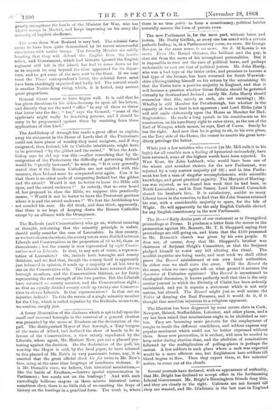The Radicals (and Conservatives) who go on, without meaning or
thought, reiterating that the minority principle is unfair, should really consider the case of Lancashire. In that county, as we have shown elsewhere, the county voters were divided between Liberals and Conservatives in the proportion of 81 to 86, there or thereabouts ; but the county is now represented by eight Conser- vatives and no Liberals. Is that, in any sort of sense, a represen- tation of Lancashire? Or, include both boroughs and county divisions, and we find that, though the county itself is apparently just balanced in opinion, it sends up a majority of all but two to one on the Conservative side. The Liberals have returned eleven borough members, and the Conservatives thirteen, so far fairly representing the real strength of the two parties. But the Liberals have returned no county member, and the Conservatives eight ; so that an equally divided county sends up twenty-one Conserva- tives to eleven Liberals. Is that representation? Is that not an injustice indeed? To this the return of a single minority member for the City, which is called injustice by the Radicals, seems to us, we confess, simply just.






































 Previous page
Previous page